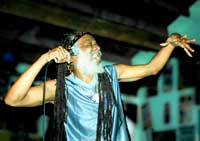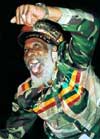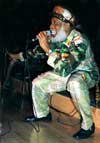
big youth; photo by ina may haggard
Manley Augustus Buchanan is a 52-year-young wiry, almost grisly man of gray. But when he takes the stage as Big Youth, he can still invigorate and educate a room full of young and old folks alike.
Big Youth put on a musical roots reggae display that left none of us doubting his place in the history of the music from the little island that has righteously impacted the musical world.
Raised in a poverty-stricken 1960’s Kingston, Jamaica, the former cab driver, mechanic, and wannabe DJ practiced his music every chance he got–at work and in the dancehalls where he deejayed on the mike.

big youth, photo by ina may haggard
His local popularity grew as he put to lyrics the everyday concerns of the downtrodden masses, and he gradually developed a reputation that finally caught the attention of record producers. Keith Hudson, who is credited as the first to record U-Roy and Dennis Alcapone released Youth’s first recording. He soon put Big Youth’s name on the Jamaican charts for good with his mega hit “S – 90 Skank” (the Ace 90 was a popular Japanese motorbike common on the streets of Jamaica in the 70’s.)
With his front teeth inlaid with jewels of red, green and gold, Big Youth represented the sound and voice of the ghetto with DJ music.
His lyrics were insightful, and socially conscious. They reflected the visions of the shanty town youth of his day infusing ska, the rhythms of Dennis Brown and Gregory Isaacs, with R&B standards in a style that is said to be a driving influence in the evolution of reggae music and reggae artists alike.

big youth, photo by ina may haggard
Listening to Big Youth, one could readily recognize similarities to the music and style of some of Jamaica’s finest. Backed by a Bay Area all-star band compiled by Fenton of the Reggae Angels, the ever intense Wadi Gad on drums, Toho S on bass, Ed on Guitar, Hodge on keyboards, and a very good horn section with Joshi and Gaven on sax & trumpet respectively, the successful Big Youth influencial sound rang clear.
Big Youth is a walking reggae history tour, a skanking history lesson, and what better place to preach history but in Berkeley at the historical Ashkenaz Community Center. If only the walls could talk. And they do with posters adorning the walls dating back to the sixties.
Roots, Roots and more Roots
Even on a Sunday night, the people came out for Big Youth.
Wadi Gad opened the show as front man, singing his original tunes. As always, he was anxious to show what he could do away from the drums.
The Reggae Angels followed. I never tire of Fenton’s one step hop, and his dynamics with the band. Their rendition of Fenton’s “Corrupt Not,” was one of the best versions I’ve heard, and the people seemed to agree.
Then a very pleased Big Youth took the stage. The people went wild before he could udder a word, and kept it up though out his performance.
“The voice of the people is the voice of God, ya know”, says Big Youth, “No matter what race, creed or color, people is just people,” and we could tell he meant it, and his voice has always been the voice of the people.
He went on to perform “Every Nigger Is A Star,” which always brings out the smiles. He then performed his infamous blend of reggae music, mixing bits and pieces from R&B songs like “Mind Blowing Decision,” “Hit The Road Jack,” and even Marvin Gaye’s “Mercy, Mercy, Me.” Then off on a Tenor Saw’s “Ring The Alarm” and Marley’s “Jammin'” remix, at times freestyling into a Scratch Perry-type rambling, then back at us with straight up dub poetry with an Africa for Africans theme.
The band kept up admirably. The horns didn’t have a lot of lines, but when they did, they were tight. During one stretch, Wadi Gad was beating his drum with the feverish look of a mad man, while Toho held the bassline groove down solid. At the end of one song Wadi moved to the front of his drums, while still playing with his back to the audience.
Big Youth may be older, but he hasn’t lost his zest on stage. Jumping, kicking, head down shaking his dreads, smiling the while, he did not show any signs of slowing down.
At one point Big Youth eyed an old friend in the audience, Earl Zero, who is making a comeback, and almost stopped his performance as he went off on a joyous tangent about the two of them working together back in the “hard days.”
Youth’s son, Tafari, who lives in Florida, came up and sang his hip-hop hit “It’s All Me.” Big Youth looked on, a proud father.
Open Door Policy
After his performance, still smiling, Big Youth flung open the backstage green room doors to his public.
Sitting with Tafari close by his side, wearing a tank top, spliffing it up, he greeted all comers.
They all gave thanks and praises for the inspiration of his music. The mature fans shared stories about the first time they saw him, and how it affected them, many even to this day. Many youth have been equally effected, one young brother gave Big Youth two CDs, saying they were hip-hop originals inspired by Youth.
He hands the two CDs to Tafari, his smile broadens–the light twinkles off the red, green & gold jewels in his teeth–he looks at his son in the eyes and says “ip-op.”





